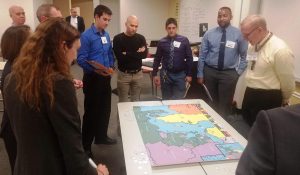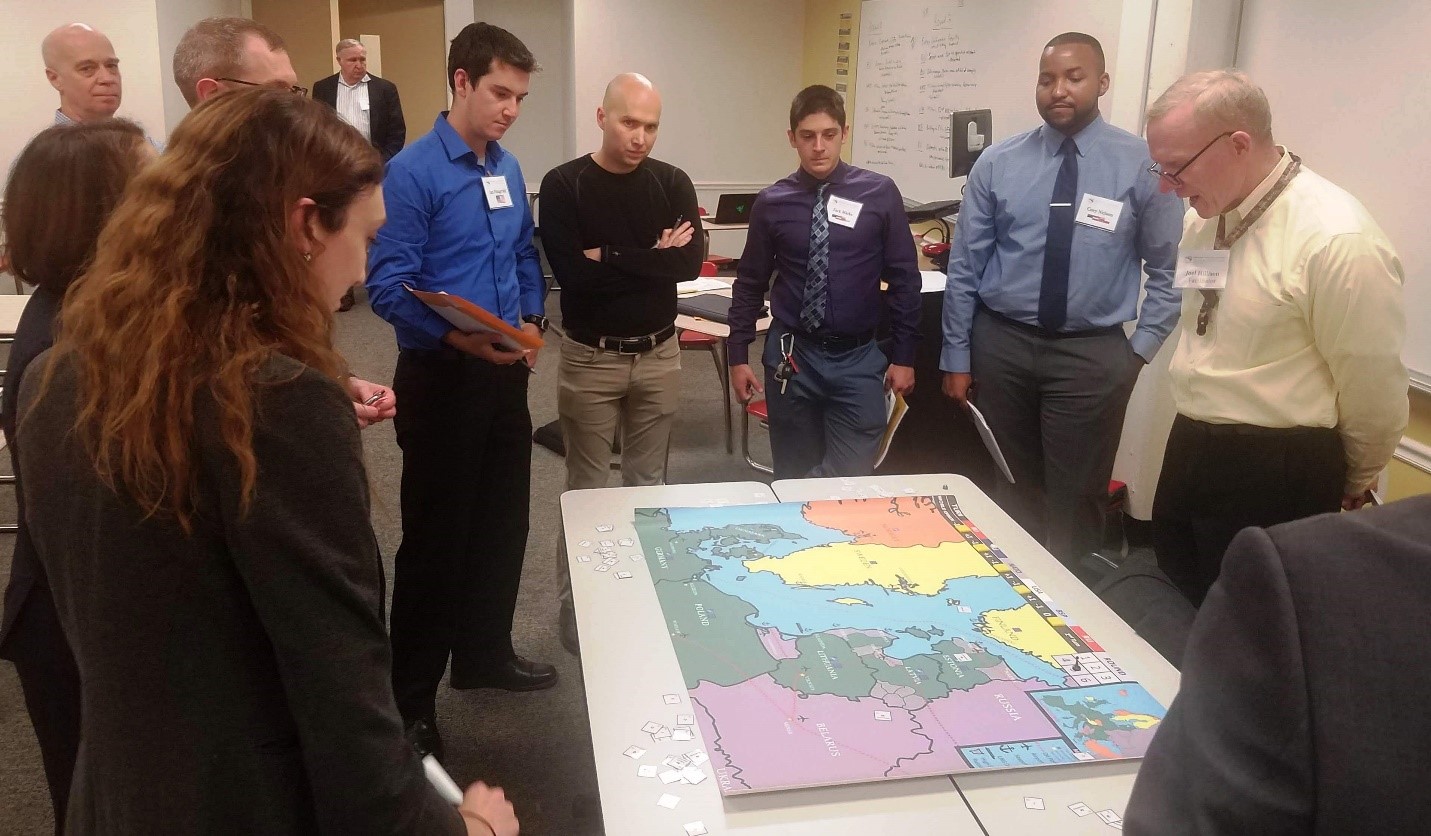By Rebecca Ames, November 10th

Each semester, CSPS invites George Mason students to participate in a crisis simulation. Crisis simulations – sometimes called war games – are frequently used by military and civilian leadership to work out possible consequences and approaches to decision making without incurring the costs of live military exercises or actual crises. CSPS focuses on scenarios that explore what Director Ellen Beth Laipson called “the gray areas, with multiple messy, unfinished threads” that are more reflective of real life; similarly, the games are designed to elicit the type of stress leaders face in practice.
On October 27th, a rainy Saturday, thirty GMU students gathered at the Fairfax campus for Crisis Simulation: Kaliningrad. They were met by expert facilitators and game designers from the US Army War College, as well as coaches who work for RAND Corporation, the Pentagon, the National Intelligence University, and George Mason and have expertise in Russian and Baltic geopolitics.
As they arrived, students were given a packet of information that contained their role, objectives, and the hypothetical scenario they would be responding to. This game was set in 2020; Poland had permanent NATO bases on its Russian border, and the United States had withdrawn from Syria, causing immigration waves into the European Union.
Participants were divided into three separate “seminars” – each seminar was made up of students playing the roles of Russia-Belarus, the United States, the European Union, NATO, and the Baltic States. At first, all three seminars began the same way: the international environment was disrupted by a diplomatic crisis involving a downed plane crashing into Estonian territory. From there participants took turns reacting to events and the moves of the other players. Seminars were led by a facilitator and supported by coaches through each round. The simulation was punctuated by facilitators delivering the latest “news report” of domestic, international, economic and political consequences of the actions in the last round, mixed with a bit random chance. As the day progressed three alternate realities developed – each seminar gave insight into how crises unfold, escalate or deescalate depending on the complex intermix of alliances, competing agendas, and personalities.
Dominika Econa brought a unique perspective to her role-playing Russia-Belarus as both a graduate student in the School of Conflict Analysis and Resolution and a native of Poland. “The fact that the simulation was set in the future was interesting, because according to that scenario NATO troops had permanent bases in Eastern Poland. Right now there is a debate in Poland for those bases; Poland wants the NATO troops to have permanent bases, and are quite vocal against any Russian intervention. I had a bookmark in my mind about Kaliningrad. It has changed hands so many times in history, but I didn’t know much about the American understanding of it; I was glad to see that it’s an international focus, because it should be.”
Another participant, Alexander Naumov, is an undergraduate pursuing a degree in Government and international Politics, an intern at the U.S. Russia Foundation, an uncontracted Army ROTC cadet. During one of the rounds of the simulation he took the opportunity to play out an idea originally proposed by the last commander of US Army Europe, Retired General Ben Hodges for creating military free transit zones. Naumov explained, “I decided to use it as one of my game options. It was interesting to see how the idea played out; it’s really unexpected. Proposals that seem good in think tank papers or as bipartisan common sense, could play out unexpectedly on a role of the die. While that was literal in the game it was an effective metaphor for the real world.”
Naumov went on to comment that the simulation was a good networking opportunity that gave him the chance to meet senior officers and faculty from the US Army War College. “I can follow up with them for future events, possibly take their classes, and hear insights on current security issues. And, it was really fun – I can tell you that.”
GMU students are encouraged to join the next CSPS simulation during spring semester, where they will be challenged with a crisis in the East China Sea. For more information, email [email protected].
Rebecca Ames is a third-year graduate student in the International Security program at the Schar School of Policy and Government. She holds a bachelor’s degree in Political Science in International Relations and American Public Policy from Boise State University. Rebecca is contractor to the Department of Homeland Security. Her areas of professional and academic interest include grand strategy, assessing organizational alignment with strategic objectives, conflict prevention and de-escalation, and decision making in the international security arena. Rebecca also pursues her interests in music, art, and international travel.




